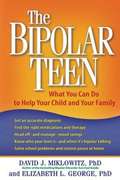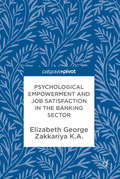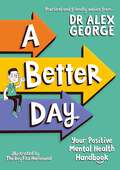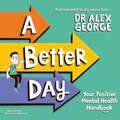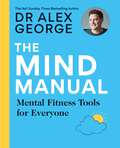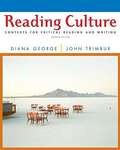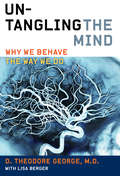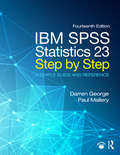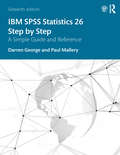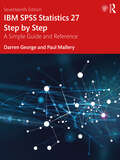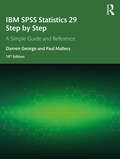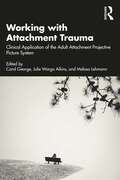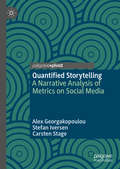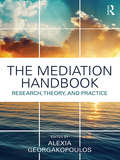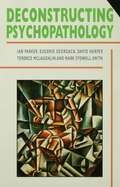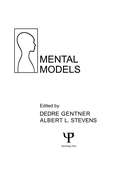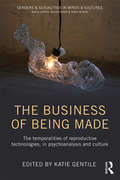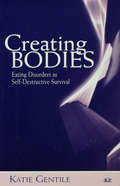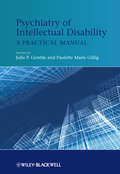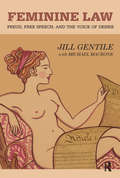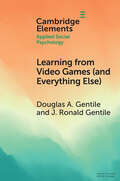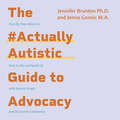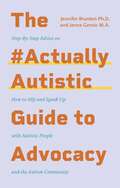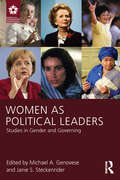- Table View
- List View
Bipolar Teen
by Elizabeth George David MiklowitzIf your teen has been diagnosed with bipolar disorder--or your child's moods seem out of control--Dr. David Miklowitz can help. The bestselling author of The Bipolar Disorder Survival Guide has tailored his proven treatment approach to meet the specific needs of teens and their families. The Bipolar Teen provides tools you can use to make home life manageable again. You'll learn to spot the differences between normal teenage behavior and the telltale symptoms of mania and depression. Together with your child's doctors, you'll be able to strike a healthy balance between medication and psychotherapy, recognize and respond to the early warning signs of an oncoming episode, and collaborate effectively with school personnel. Like no other resource available, this powerful book delivers practical ways to manage chaos and relieve stress so everyone in your family--including siblings--can find stability, support, and peace of mind.
Psychological Empowerment and Job Satisfaction in the Banking Sector
by Elizabeth George Zakkariya K. A.This book explores how psychological empowerment can influence and enhance job satisfaction. The authors argue that in today’s working climate the wellbeing and involvement of employees is of utmost importance to any company’s overall success and that management techniques like empowerment are the most effective means of achieving this goal. Based on an empirical study examining job satisfaction amongst employees of several private sector, public sector and new generation banks in Kerala, India as well as extensive literature review, this book discusses the role psychological empowerment plays in enhancing job satisfaction both locally and internationally. It goes on to analyze four dimensions of psychological empowerment and the role of job satisfaction in the relationship between psychological empowerment and job related stress. This book will be of great interest to scholars in management and psychology and is essential reading for industrialists and managers wanting to apply empowerment strategies in their own workplace.
A Better Day: Your Positive Mental Health Handbook
by Dr. Alex GeorgeDr Alex George's debut book for children and young people.What if we could think of mental health in a positive way? Sweep away the rain clouds. Talk about what's on our minds. And care for our mental health in the same way we look after our bodies.In this empowering and hopeful handbook, Youth Mental Health Ambassador Dr Alex George is here to show us how.A Better Day is a positive, accessible and practical toolkit guiding young readers in how they can care for their mental health with confidence. From peer pressure and exam stress to online trolls and anxiety, life can be mentally draining. But though life is full of ups and downs, there are ways you can stay on top of your mental health - including overcoming stigma, talking about your feelings, developing resilience and switching your mindset.This book provides all the scaffolding and practical techniques to help you do this, so though you might be having a hard time right now, you can look toward your future with optimism and positivity. Because no matter what, there is always hope for a better day.
A Better Day: Your Positive Mental Health Handbook
by Dr. Alex GeorgeDr Alex George's debut audiobook for children and young people.What if we could think of mental health in a positive way? Sweep away the rain clouds. Talk about what's on our minds. And care for our mental health in the same way we look after our bodies.In this empowering and hopeful audio handbook, Youth Mental Health Ambassador Dr Alex George is here to show us how.A Better Day is a positive, accessible, and practical toolkit guiding young listeners in how they can care for their mental health with confidence. From peer pressure and exam stress to online trolls and anxiety, life can be mentally draining. But though life is full of ups and downs, there are ways you can stay on top of your mental health - including overcoming stigma, talking about your feelings developing resilience and switching your mindset.This audiobook provides all the scaffolding and practical techniques to help you do this, so though you might be having a hard time right now, you can look toward your future with optimism and positivity. Because no matter what, there is always hope for a better day.(P) 2022 Hodder & Stoughton Limited
The Mind Manual: Mental Fitness Tools for Everyone (Dr Alex George)
by Dr Alex GeorgeMental health matters! Learn how to assess your mental health today - and understand what's normal for you. Discover the seven universal truths that everyone should remember, and the mental fitness foundations that will boost you. And exercise your mind with the mental health toolkit that will help you thrive. Contents include -Part One: Your Mental Health Today-You are not alone-Know what feels normal for youPart Two: The Seven Universal Truths-Boundaries are beautiful-Mistakes are a must-havePart Three: Mental Fitness Foundations-It's good to talk-Why medical help mattersPart Four: Mental Health ToolkitResources
The Mind Manual: Mental Fitness Tools for Everyone (Dr Alex George)
by Dr Alex GeorgeMental health matters! Learn how to assess your mental health today - and understand what's normal for you. Discover the seven universal truths that everyone should remember, and the mental fitness foundations that will boost you. And exercise your mind with the mental health toolkit that will help you thrive. Contents include -Part One: Your Mental Health Today-You are not alone-Know what feels normal for youPart Two: The Seven Universal Truths-Boundaries are beautiful-Mistakes are a must-havePart Three: Mental Fitness Foundations-It's good to talk-Why medical help mattersPart Four: Mental Health ToolkitResources
Reading Culture: Contexts for Critical Reading and Writing
by Diana George John TrimburAcclaimed for its compelling readings and provocative images,Reading Culture provides students with outstanding instruction on how to read and write critically about the culture that surrounds them.
Untangling the Mind
by David Theodore GeorgeFree yourself from emotional turmoileven when that turmoil is caused by others We have a much greater understanding of human behavior now than we did just a few decades ago. Yet even with this greater understanding of the human mind, why we do what we do can sometimes seem like a mystery. People are often left with unsettling questions about their own (or others) behavior. We ask ourselves, Why did I make a spectacle of myself? Why am I so stressed? Why am I constantly so negative?In his years as a clinician, Dr. Ted George has been struck by how much easier it is for people to say they have a physical illness than it is to admit they feel out of control with an emotion--be it anger, fear, or depression. With a physical issue, you have the source of the problem in concrete terms, such as in a lab report, but with an emotional issue, it can be much harder to define whats gone wrong. Untangling the Mind helps make sense of whats happening--and why. With knowledge of how the brain translates sensory signals into emotions, you will increase your understanding of your own--and others--behaviors. As you learn about your psychological and neurological makeup, you will begin to see new possibilities for optimism, motivation, and well-being. We can control our behavior and our feelings, no matter how much they may have ruled us in the past, and Dr. George helps us know how. Once you understand the deeply rooted instincts that activate your emotions, you can live more peacefully, behave in ways that are more in keeping with the person youd like to be, and enjoy your life more fully. And youll be better able to remain unaffected by the drama of other peoples emotional storms.
IBM SPSS Statistics 23 Step by Step: A Simple Guide and Reference (14th Edition)
by Darren George Paul MalleryIBM SPSS Statistics 23 Step by Step: A Simple Guide and Reference, 14e, takes a straightforward, step-by-step approach that makes SPSS software clear to beginners and experienced researchers alike. Extensive use of vivid, four-color screen shots, clear writing, and step-by-step boxes guide readers through the program. Exercises at the end of each chapter support students by providing additional opportunities to practice using SPSS. All datasets used in the book are available for download at: https://www.routledge.com/products/ 9780134320250
IBM SPSS Statistics 26 Step by Step: A Simple Guide and Reference
by Darren George Paul MalleryIBM SPSS Statistics 26 Step by Step: A Simple Guide and Reference, sixteenth edition, takes a straightforward, step-by-step approach that makes SPSS software clear to beginners and experienced researchers alike. Extensive use of four-color screen shots, clear writing, and step-by-step boxes guide readers through the program. Output for each procedure is explained and illustrated, and every output term is defined. Exercises at the end of each chapter support students by providing additional opportunities to practice using SPSS. This book covers the basics of statistical analysis and addresses more advanced topics such as multi-dimensional scaling, factor analysis, discriminant analysis, measures of internal consistency, MANOVA (between- and within-subjects), cluster analysis, Log-linear models, logistic regression and a chapter describing residuals. Back matter includes a description of data files used in exercises, an exhaustive glossary, suggestions for further reading and a comprehensive index. IMB SPSS Statistics 26 Step by Step is distributed in 85 countries, has been an academic best seller through most of the earlier editions, and has proved invaluable aid to thousands of researchers and students. New to this edition: Screenshots, explanations, and step-by-step boxes have been fully updated to reflect SPSS 26 How to handle missing data has been revised and expanded and now includes a detailed explanation of how to create regression equations to replace missing data More explicit coverage of how to report APA style statistics; this primarily shows up in the Output sections of Chapters 6 through 16, though changes have been made throughout the text.
IBM SPSS Statistics 27 Step by Step: A Simple Guide and Reference
by Darren George Paul MalleryIBM SPSS Statistics 27 Step by Step: A Simple Guide and Reference, seventeenth edition, takes a straightforward, step-by-step approach that makes SPSS software clear to beginners and experienced researchers alike. Extensive use of four-color screen shots, clear writing, and step-by-step boxes guide readers through the program. Output for each procedure is explained and illustrated, and every output term is defined. Exercises at the end of each chapter support students by providing additional opportunities to practice using SPSS. This book covers the basics of statistical analysis and addresses more advanced topics such as multidimensional scaling, factor analysis, discriminant analysis, measures of internal consistency, MANOVA (between- and within-subjects), cluster analysis, Log-linear models, logistic regression, and a chapter describing residuals. The end sections include a description of data files used in exercises, an exhaustive glossary, suggestions for further reading, and a comprehensive index. IBM SPSS Statistics 27 Step by Step is distributed in 85 countries, has been an academic best seller through most of the earlier editions, and has proved an invaluable aid to thousands of researchers and students. New to this edition: Screenshots, explanations, and step-by-step boxes have been fully updated to reflect SPSS 27 A new chapter on a priori power analysis helps researchers determine the sample size needed for their research before starting data collection.
IBM SPSS Statistics 29 Step by Step: A Simple Guide and Reference
by Darren George Paul MalleryIBM SPSS Statistics 29 Step by Step: A Simple Guide and Reference, eighteenth edition, takes a straightforward, step-by-step approach that makes SPSS software clear to beginners and experienced researchers alike.Extensive use of four-color screen shots, clear writing, and step-by-step boxes guide readers through the program. Output for each procedure is explained and illustrated, and every output term is defined. Exercises at the end of each chapter support students by providing additional opportunities to practice using SPSS. This book covers the basics of statistical analysis and addresses more advanced topics such as multidimensional scaling, factor analysis, discriminant analysis, measures of internal consistency, MANOVA (between- and within-subjects), cluster analysis, Log-linear models, logistic regression, and a chapter describing residuals. New to this edition is a new chapter on meta-analysis that describes new SPSS procedures for analyzing effect sizes across studies, and the content has been thoroughly updated in line with the latest version of the SPSS software, SPSS 29. The end sections include a description of data files used in exercises, an exhaustive glossary, suggestions for further reading, and a comprehensive index.Accompanied by updated online instructor’s materials and website data files, this is an essential resource for instructors and students needing a guide to using SPSS in their work, across the social sciences, behavioural sciences, education, and beyond.
Working with Attachment Trauma: Clinical Application of the Adult Attachment Projective Picture System
by Carol GeorgeThe Adult Attachment Projective Picture System (AAP) has served as a prominent assessment tool for adults and adolescents internationally for over 20 years. This book introduces the AAP and illustrates the powerful potential for implementing the AAP in clinical practice for assessment, client conceptualization, treatment planning, analysis, and as a therapeutic guide. Chapters discuss the full scope of incomplete pathological mourning for attachment trauma, including for the first time in the field Failure to Mourn and Preoccupation with Personal Suffering. Seasoned clinical researchers and psychotherapists provide a snapshot of their clients' unique attachment characteristics and defensive exclusion strategies as assessed by the AAP, and discuss how to use this information in treatment, as well as how to present the AAP results to their clients. This book introduces readers to how the AAP can be used with adolescents, adults, and couples, and in custody evaluation and foster care.
Quantified Storytelling: A Narrative Analysis of Metrics on Social Media
by Alex Georgakopoulou Stefan Iversen Carsten StageThis book interrogates the role of quantification in stories on social media: how do visible numbers (e.g. of views, shares, likes) and invisible algorithmic measurements shape the stories we post and engage with? The links of quantification with stories have not been explored sufficiently in storytelling research or in social media studies, despite the fact that platforms have been integrating sophisticated metrics into developing facilities for sharing stories, with a massive appeal to ordinary users, influencers and businesses alike. With case-studies from Instagram, Reddit and Snapchat, the authors show how three types of metrics, namely content metrics, interface metrics and algorithmic metrics, affect the ways in which cancer patients share their experiences, the circulation of specific stories that mobilize counter-publics and the design of stories as facilities on platforms. The analyses document how numbers structure elements in stories, indicate and produce engagement and become resources for the tellers’ self-presentation. This book will be of interest to students and scholars working in the fields of narrative and social media studies, including narratology, biography studies, digital storytelling, life-writing, narrative psychology, sociological approaches to narrative, discourse and sociolinguistic perspectives.
The Mediation Handbook: Research, theory, and practice
by Alexia GeorgakopoulosThe Handbook of Mediation gathers leading experts across fields related to peace, justice, human rights, and conflict resolution to explore ways that mediation can be applied to a range of spectrums, including new age settings, relationships, organizations, institutions, communities, environmental conflicts, and intercultural and international conflicts. The text is informed by cogent theory, state-of-the-art research, and best practices to provide the reader with a well-rounded understanding of mediation practice in contemporary times. Based on four signature themes—contexts; skills and competencies; applications; and recommendations—the handbook provides theoretical, applicable, and practical insight into a variety of key approaches to mediation. Authors consider modern conflict on a local and global scale, emphasizing the importance of identifying effective strategies, foundations, and methods to shape the nature of a mediation mindfully and effectively. With a variety of interdisciplinary perspectives, the text complements the development of the reader’s competencies and understanding of mediation in order to contribute to the advancement of the mediation field. With a conversational tone that will welcome readers, this comprehensive book is essential reading for students and professionals wanting to learn a wide range of potential interventions for conflict.
Deconstructing Psychopathology
by Dr Eugenie Georgaca Dr David Harper Mr Terence Mclaughlin Dr Mark Stowell-Smith Professor Ian Patrick`Fast becoming a contemporary classic... this book tries both to be critical and engender critical thinking in a number of ways. It offers an overview of a number of theories that address human distress as well as particular forms of "pathology". This book effectively highlights the way that western society has taken "normal"; and "abnormal" emotional states to be factual entities rather than the constructed understandings of human phenomena that they are.... should be on the reading list of every course/module that attends to human distress' - Journal of the Society for Existential Analysis This practical and accessible critique of the institutions, practices and presuppositions that underlie the study of `psychopathology' will be invaluable for students and practitioners who are working to understand mental health and distress. The authors - who come from backgrounds in clinical psychology, psychiatric social work, psychoanalysis, psychology teaching and action research - challenge the traditions of the field. They analyze the notion of `psychopathology' as a conventional term in psychology and psychiatry through the language and institutions that hold it in place; and explore the implications of deconstructive ideas for the theories and practices that sustain clinical treatments; and offer an alternative way of seeing `psychopathology', with accounts of critical professional work and good practice. Deconstructing Psychopathology is invaluable reading for students, academics and practitioners across a range of disciplines who are working to understand mental health and distress, including clinical and counselling psychology, psychiatry, psychiatric social work, counselling and psychotherapy.
Mental Models
by Dedre Gentner Albert L. StevensThis classic volume compiles and describes interdisciplinary research on the formal nature of human knowledge about the world. Three key dimensions that characterize mental models research are examined: the nature of the domain studied, the nature of the theoretical approach, and the nature of the methodology.
The Business of Being Made: The temporalities of reproductive technologies, in psychoanalysis and culture (Genders & Sexualities in Minds & Cultures)
by Katie GentileThe Business of Being Made is the first book to critically analyze assisted reproductive technologies (ARTs) from a transdisciplinary perspective integrating psychoanalytic and cultural theories. It is a ground-breaking collection exploring ARTs through diverse methods including interview research, clinical case studies, psychoanalytic based ethnography, and memoir. Gathering clinicians and researchers who specialize in this area, this book engages current research in psychoanalysis, sociology, anthropology, philosophy and debates in feminist, queer and cultural theory about affect, temporality, and bodies. With psychoanalysis as its fulcrum, The Business of Being Made explores the social constructions and personal experiences of ARTs. Katie Gentile frames the cultural context, exploring the ways ARTs have become a complex form of playing with time, attempting to manufacture a hopeful future in the midst of growing global uncertainty. The contributors then present a range of varied experiences related to ARTs, including: Interviews with women and men undergoing ARTs; A psychoanalytic memoir of male infertility; Clinical research and work with transgender, gay and lesbian patients creating new Oedipal constellations, the experiences of LBGTQ people within the medical system and the variety of families that emerge; Research on the experiences of egg donors (now central to the business of ARTs) and a corresponding clinical case study of successful egg donation; The experiences of ongoing failure which is the often unacknowledged for ART procedures; How and when people choose to stop using ARTs; A psychoanalytic ethnography of a neonatal intensive care unit populated in part with the babies created through these technologies and their parents, haggard and in shock after years of failed attempts. Full of original material, The Business of Being Made conveys the ambivalence of these technologies without simplifying their complicated consequences for the bodies of individuals, the family, cultures, and our planet. This book will be relevant to clinicians, medical and psychological personnel working in assisted reproductive technologies and infertility, as well as academics working in the fields of sociology, literature, queer and feminist theories and at the intersections of cultural, critical and psychoanalytic theories.
Creating Bodies: Eating Disorders as Self-Destructive Survival (Relational Perspectives Book Series #33)
by Katie GentileAmid the welter of clinical studies, memoirs, and other death-defying tales of eating disorders, we remain unclear about the relationships among trauma, anorexia, and bulimia, and about the psychological pathways to recovery. Creating Bodies offers the gripping story of healing and transformation detailed in one woman's diaries. Hannah wrote 18 diaries between the ages of 14 and 32. In the excerpts reprinted herein, we watch Hannah navigate violent adolescent friendships, descend into anorexia and bulimia, marry an abusive man, struggle to recover memories of sexual abuse, and finally to heal. And we learn of her interaction with Katie Gentile, who analyzed her diaries and met with Hannah to discuss the latter's own understanding of the diaries and of the diary analysis. Through a close study of both the content and structure of Hannah's diaries, Gentile shows how unspeakable, embodied remnants of sexual trauma become symbolized and how, within this process, Hannah's bulimia functioned as both an act of self destruction and a lifesaving form of resistance. Anchored in relational psychoanalysis and critical feminist theory, Creating Bodies provides a uniquely longitudinal account of the development of, and ultimate recovery from, an eating disorder fueled by childhood sexual abuse. An invaluable contribution to the literature on adolescent and adult eating disorders, it is also a thoughtful meditation on how the act of writing deepens issues of relationality and, over time, promotes cure. Psychoanalysts will be intrigued by the rich process issues embedded in prose journals, notes, and letters - both close to and distinct from clinical process issues - that Gentile uses to understand Hannah's projects of self-destruction and reconstruction.
Psychiatry of Intellectual Disability
by Julie P. Gentile Paulette Marie GilligPatients with intellectual disability (ID) can benefit from the full range of mental health services. To ensure that psychiatric assessment, diagnosis and treatment interventions are relevant and effective; individuals with ID should be evaluated and treated within the context of their developmental framework. Behavior should be viewed as a form of communication.Individuals with ID often present with behavioral symptoms complicated by limited expressive language skills and undiagnosed medical conditions. Many training programs do not include focused study of individuals with ID, despite the fact that patients with ID will be seen by virtually every mental health practitioner. In this book, the authors present a framework for competent assessment and treatment of psychiatric disorders in individuals with ID.Psychiatry of Intellectual Disability is a resource guide for psychiatrists, nurse practitioners, and other prescribers treating patients with ID. It is a supplemental text for psychiatry residents, medical students, psychology graduate students, psychotherapists, counselors, social workers, behavior support specialists and nurses. To assist the practicing clinician the book includes:Clinical vignettesClinical pearlsCharts for quick referenceIssues concerning medications and poly-pharmacyAltered diagnostic criteria specific for use with individuals with IDThere are no evidence-based principles dedicated to psychotropic medication use in ID, but consensus guidelines address the high prevalence of poly-pharmacy. Altered diagnostic criteria have been published which accommodate less self-report and incorporate collateral information; this book reviews the literature on psychotropic medications, consensus guidelines, and population-specific diagnostic criteria sets.Psychiatry of Intellectual Disability also includes:Interviewing techniques and assessment tips for all levels of communicative ability as well as for nonverbal individualsAssessment of aggression to determine etiology and formulate a treatment planOverview of types of psychotherapy and suggested alterations for each to increase efficacyRelevant legal issues for caregivers and treatment providersThe detective work involved in mental health assessment of individuals with ID is challenging yet rewarding. The highest quality mental health treatment limits hospital days, improves quality of life and often allows individuals to live in the least restrictive environments. Psychiatry of Intellectual Disability is a must have resource for clinicians treating the ID population.
Feminine Law: Freud, Free Speech, and the Voice of Desire
by Jill Gentile Michael MacroneFeminine Law: Freud, Free Speech, and the Voice of Desire explores the conjunction between psychoanalysis and democracy, in particular their shared commitments to free speech. In the process, it demonstrates how lawful constraints enable an embodied space or "gap" for the potentially disruptive but also liberating and novel flow of desire and its symbols. This space, intuited by the First Amendment as it is by Freud's free association, enables personal and collective sovereignty. By naming a "feminine law," we mark the primacy a space between the conceivable and the inconceivable, between knowledge and mystery. What do political free speech and psychoanalytic free association have in common, besides the word "free"? And what do Sigmund Freud and Justice Louis Brandeis share besides a world between two great wars? How is the female body a neglected key to understanding the conditions and contradictions of free discourse? Drs. Jill Gentile and Michael Macrone take up these questions, and more, in their wide-ranging, often passionate exploration of the hidden legacy of Freud and the Founding Fathers.
Learning from Video Games: The General Learning Model (Elements in Applied Social Psychology)
by Douglas A. Gentile J. Ronald GentileVideo games can have many effects on players, some of which could be intentional effects (e.g., games designed to train health compliance behaviors), and most of which are unintentional (e.g., violent games, stereotypes, gaming disorder). Some of these areas of research have been seen as controversial, but many of the controversies can be at least partially resolved by considering the learning mechanisms underlying the effects. We describe the General Learning Model in greater detail than has been provided elsewhere, including short-term and long-term mechanisms, processes of learning and forgetting, and moderators of learning. Video games use many of the best practices to train for both mastery and for transfer of learning. The implications for re-interpreting the literature on violent video games and gaming disorder, as well as for applied social psychology broadly defined, are discussed.
The #ActuallyAutistic Guide to Advocacy: Step-by-Step Advice on How to Ally and Speak Up with Autistic People and the Autism Community
by Jenna Gensic Jennifer BruntonThe #ActuallyAutistic Guide to Advocacy takes an in-depth look at the key elements of effective, respectful, inclusive advocacy and allyship. Every topic was chosen, shaped, and informed by #ActuallyAutistic perspectives.The step-by-step guide discusses various aspects of how autism is perceived, explores how best to speak up for individual needs, and introduces advocacy for the wider autistic community. Each step outlines one vital aspect of advocacy and allyship, such as emphasizing acceptance, avoiding assumptions and assuming competence. The advice and strategies laid out in this guide center the wisdom and experiences of Autistic people and enable the listener to confidently speak up with insight and understanding.(P) 2022 Jessica Kinglsey Publishers
The #ActuallyAutistic Guide to Advocacy: Step-by-Step Advice on How to Ally and Speak Up with Autistic People and the Autism Community
by Jenna Gensic Jennifer BruntonThe #ActuallyAutistic Guide to Advocacy takes an in-depth look at the key elements of effective, respectful, inclusive advocacy and allyship. Every topic was chosen, shaped, and informed by #ActuallyAutistic perspectives. The step-by-step guide discusses various aspects of how autism is perceived, explores how best to speak up for individual needs, and introduces advocacy for the wider autistic community. Each step outlines one vital aspect of advocacy and allyship, such as emphasizing acceptance, avoiding assumptions and assuming competence. The advice and strategies laid out in this guide center the wisdom and experiences of Autistic people and enable the reader to confidently speak up with insight and understanding.
Women as Political Leaders: Studies in Gender and Governing (Leadership: Research and Practice)
by Michael A. Genovese Janie S. SteckenriderOver the past several years, the fields of Leadership Studies and of Women's Studies have grown tremendously. This book, which is a series of case studies of women who have headed governments across the globe, will discuss the conditions and situations under which women rose to power and give a brief biography of each woman . A special chapter on why no U.S. woman has risen to the top, and a review of the political campaigns of Hillary Clinton, Michele Bachmann and others will be included. This book will be of interest for courses in women and leadership, global politics and gender studies.
